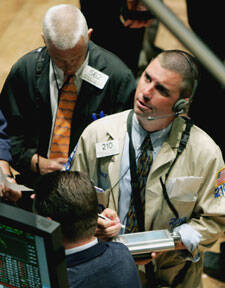What went wrong? The immediate cause of the recession was the crisis in the subprime credit market. Banks made loans for home purchases to people with poor credit ratings. Often the loans had low down payments and initially low interest rates that would later jump to higher levels. Many of these borrowers did not understand the contracts they were signing. Banks then packaged these loans as securities and sold them to investors.
Why would mortgage companies, banks and investors make loans to risky borrowers who were likely to default on their loans? The answer is simple. With housing prices going up, if borrowers could not meet their payments, banks and investors would hold an asset that was worth more than it was when the loan was first made. The house could then be sold to another unwary buyer. But when housing prices fell, investors were left with assets that did not cover the amount of the loans.
The financial institutions that made these predatory loans and marketed them to investors deserve no sympathy. They are simply being punished by the market for gambling that housing prices would not fall. Investors who were fully informed and understood the risks also deserve little sympathy.
But the question remains, were investors fully informed? Wall Street’s enthusiasm for deregulation has come home to haunt it. If government regulations for financial institutions had required more transparency and clearer disclosure to borrowers as well as investors, we would not be in this crisis today. It is ironic that those who sang the praises of an unregulated free market as long as they were making money are now rushing to Washington for help. One important lesson of this recession is that not all government regulations are bad for business.
The subprime credit crisis has caused a crisis in the entire credit system. It will take time for the system to digest billions of dollars in losses. Meanwhile, investors and lenders have lost confidence in the system itself. In the short run, there is little the government can do. Providing fiscal stimulus and reducing interest rates will not do much to restore confidence. In the long run, requiring more transparency by banks and marketers of securities is needed.
Even without the subprime crisis, this recession was inevitable. The U.S. government and consumers have been spending beyond their means for years. Credit card debt is too high; our balance of payments has been out of whack for decades; and for the first time in history, we are waging a war without raising taxes. As a result, we have become dependent on the equivalent of loans from China and the oil producing countries.
Now that we are in an economic downturn, what will Washington do? Surprisingly, a bipartisan consensus has developed in favor of a fiscal stimulus that is timely, temporary and targeted. This consensus has more to do with the coming election than with agreement about economics.
Timely. The stimulus is needed as soon as possible if it is going to help at all. One problem is that for technical reasons, the I.R.S. probably cannot send out refund checks before the third week in June. Food stamp payments could be increased more quickly. Extending unemployment insurance payments would also have an immediate effect, but public works programs would take too long to activate.
Temporary. Any tax cuts or spending that increases the deficit permanently will not deal with our long-term economic problems. In fact, such measures could be counterproductive. Unfortunately, President Bush reiterated in his State of the Union address his desire to see the tax cuts of his first term made permanent.
Targeted. President Bush and House leaders have agreed to an income tax rebate. The working poor, who pay Social Security taxes but not income taxes, will also receive a check. Studies of earlier rebates show that the poor first use their rebates to pay down their credit card debt, but within a couple of months they stimulate the economy by increasing their spending.
A $150-billion stimulus package will have a limited impact on our $14-trillion economy. But if $100 billion of it is spent in one quarter, it could increase growth by 3 percent, which might be just enough to move the economy from negative to positive numbers. Will this encourage us to face our long-term economic issues, or will we again put our heads in the sand and go about business as usual?








